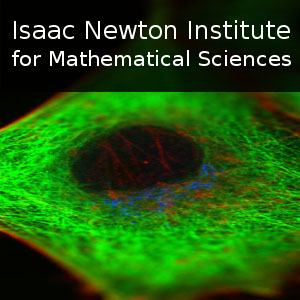Cancer ID - From Spectral Segmentation to Deep Learning
Duration: 47 mins 14 secs
Share this media item:
Embed this media item:
Embed this media item:
About this item

| Description: |
Brune, C
Monday 30th October 2017 - 12:00 to 12:50 |
|---|
| Created: | 2017-10-31 14:13 |
|---|---|
| Collection: | Variational methods and effective algorithms for imaging and vision |
| Publisher: | Isaac Newton Institute |
| Copyright: | Brune, C |
| Language: | eng (English) |
| Distribution: |
World
|
| Explicit content: | No |
| Aspect Ratio: | 16:9 |
| Screencast: | No |
| Bumper: | UCS Default |
| Trailer: | UCS Default |
| Abstract: | One of the most important challenges in health is the fight against cancer. A desired goal is the early detection and guided therapy of cancer patients. A very promising approach is the detection and quantification of circulating tumor cells in blood, called liquid biopsy. However, this task is similar to looking for needles in a haystack, where the needles even have unclear shapes and materials. There is a strong need for reliable image segmentation, classification and a better understanding of the generative composition of tumor cells. For a robust and reproducible quantification of tumor cell features, automatic multi-scale segmentation is the key. In recent years, new theory and algorithms for nonlinear, non-local eigenvalue problems via spectral decomposition have been developed and shown to result in promising segmentation and classification results. We analyze different nonlinear segmentation approaches and evaluate how informative the resulting spectral responses are. The success of our analysis is supported by results of simulated cells and first European clinical studies. In the last part of this talk we switch the viewpoint and study first results for deep learning of tumor cells. Via generative models there is hope for understanding tumor cells much better, however many mathematical questions arise. This is a joint work with Leonie Zeune, Stephan van Gils, Guus van Dalum and Leon Terstappen. |
|---|---|
Available Formats
| Format | Quality | Bitrate | Size | |||
|---|---|---|---|---|---|---|
| MPEG-4 Video | 640x360 | 1.93 Mbits/sec | 685.07 MB | View | Download | |
| WebM | 640x360 | 578.3 kbits/sec | 200.13 MB | View | Download | |
| iPod Video | 480x270 | 522.27 kbits/sec | 180.68 MB | View | Download | |
| MP3 | 44100 Hz | 249.75 kbits/sec | 86.49 MB | Listen | Download | |
| Auto * | (Allows browser to choose a format it supports) | |||||

